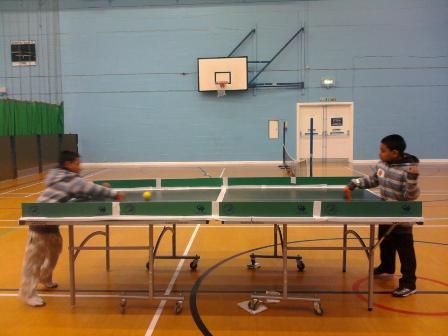
Amie Samba
High and low expectations
With extensive experience of disability sports provision in East London, Amie Samba explores the high expectations of volunteers and low expectations of its beneficiaries.

Amie Samba
It is a sunny Tuesday morning, 9am in June and a beautiful view over the Docklands area in East London beckons as I make my way to meet a colleague. After weeks and many hours of planning how we were going to assist community groups with their existing disability sports provisions we were finally there to put it into practice. For weeks we had been corresponding with community leaders. We had high expectations and belief in all involved, expectations further elevated by the initial warm welcome and anticipation by the disability advocates. Little did we know that this enthusiasm and motivation was not shared by some community leaders.
It almost goes without saying that social exclusion is the key barrier to the development of disability sports provision in East London. According to the office for disability issues, 21% of children in families with at least one disabled member are in poverty compared to 16% of children in families with no disabled member. However, the managers, teachers, support workers, coaches, youth workers, leaders, etc with the responsibility of helping to reverse this barrier, whether in local authorities, national governing bodies, local sports clubs, charities or youth clubs, are struggling to deal with one significant issue. The issue of disempowered parents of young disabled children is yet to be addressed and in most cases even identified. If it has been noted at all its threat to the development of disability sports in this area has been gravely underestimated.
This lack of belief in smaller communities by professionals has manifested into little confidence in, and sometimes mistrust of, the provision that is on offer. Consequently it can be argued that existing disability provision has done little to help reduce the formation of smaller cluster communities who feel that further isolation and dependency on their limited network is the only option for solace. In this area of London mothers are usually the main care providers of these young disabled children. Women specifically of Bangladeshi/Asian origin often feel unable to integrate effectively within the wider community. Due to the disempowerment that has been created by the environment in which they live, these women struggle to emulate a positive future for their children. This is having a detrimental effect on disabled children expanding their horizons.
After a number of morning meetings a theme began to emerge. The underlying problem had been unintentionally disguised by the fact that professionals are smothered by the daily grind of running community sports projects. Being inundated and worried with daily tasks like funding applications can take its toll and it had caused them to become passive. The danger in becoming so immersed in these daily tasks, which of course are necessary, is that the real problem that can be tackled head on ends up not actually being addressed. It is easy to point to an unsuccessful funding application as the cause of beneficiaries becoming unresponsive to existing provision but in some parts of East London the existing network of disability provision is rather fragmented. Organisations expect locals to approach their provision rather than bringing the sports to the doorstep of disabled residents.
Conversely, there seems to be high expectations of volunteers. In 2013 the Sport and Recreation Alliance reported that nearly two million adults in England contribute at least one hour a week to volunteering in sport and sports volunteering is at the heart of the current government’s policy of sports in the community. In schemes such as the London Legacy Development Corporation and Pro-Active East London’s ‘Active People, Active Park’ scheme a lot of training, funding and consultation is being offered to volunteers. Schemes like this are very keen to identify volunteers’ needs and ensure they are confident enough to lead the provisions to be offered to the wider community. It is all about empowering volunteers and this is very welcome because volunteers of play a vital role in the stability and foundation of many community sports projects.
In the same way that time and effort is being invested in empowering sports volunteers it would also make sense to empower young disabled children and their parents by consulting them and investigating what exactly they want from disability sports provision. Equally beneficiaries need to feel they have the genuine belief and support of providers. Volunteers are buoyant and ready to start supporting the provisions but we have a mismatch of attitude, confidence and belief. In addition providers should be wary of the mismatch of volunteers and beneficiaries. It is crucial that volunteers understand participants’ background, experience and cultural norms in order to contribute to building empowerment.
After all the promises about huge projects, which parents and children are expected to buy into without fail, there may be a lot of disappointment ahead for volunteers. The fact is that if the parents of disabled children of school age do not feel the provision being offered is uplifting them in anyway then the chances of their children feeling uplifted is pretty slim. If this is their experience throughout their school years do we then expect young disabled people to feel encouraged to participate in sport in the post-16 years? There is also a risk of an imbalance in the number of volunteers and participants because of an unequal approach. There is no point in having volunteers if there are no participants and the excellent, hard-working volunteers out there are likely to drop out if there is no improvement in sight.
In this economic climate it is difficult enough to retain your best employees let alone a volunteer who is taking their time out to support a provision. If we are really serious about participation levels for disability sports provision in East London then we must have high expectations of its beneficiaries and address the problem of disempowerment. Unless this is done the disillusionment will continue to filter into a cycle of hopelessness, low expectations and empty sports halls.
Amie Samba the director and founder of Run Fun Starz. Find them online at www.runfunstarz.com
The Leisure Review, November 2013
© Copyright of all material on this site is retained by The Leisure Review or the individual contributors where stated. Contact The Leisure Review for details.
![]() Download a pdf version of this article for printing
Download a pdf version of this article for printing
